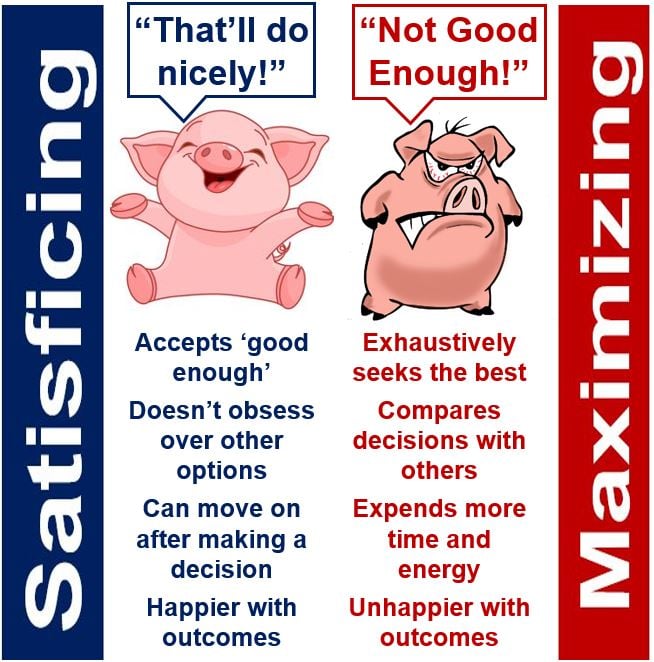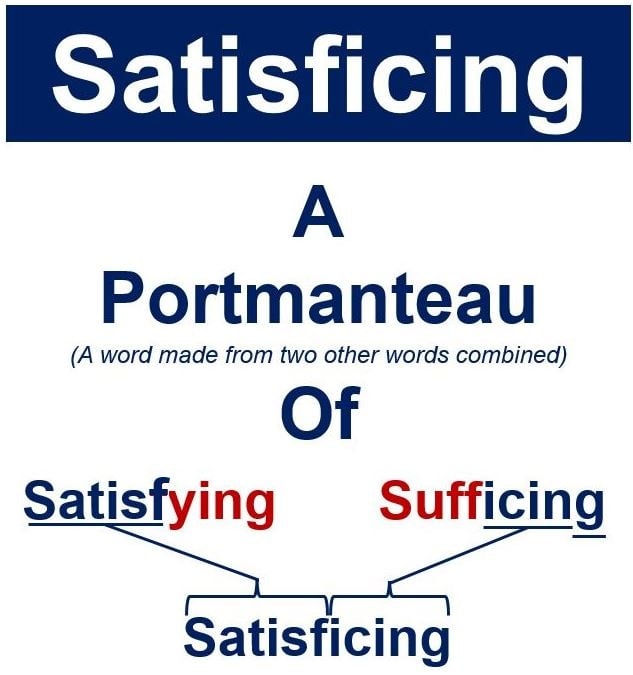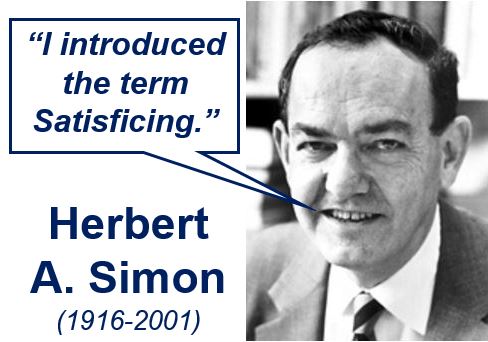What is satisficing? Definition and meaning
Satisficing, a combination of satisfying and sufficing, means accepting what is good enough rather than seeking the best option possible (maximizing). The decision makers search through the available choices until an acceptability threshold is met. Satisficing, a decision-making strategy, commonly occurs when the deciders are attempting to pursue several goals at the same time.
Classical and Neo-Classical economists assume that governments, companies, people and other entities try to achieve the best possible outcome from their decisions.
Satisficing suggests that we all decide a level of achievement that is good enough for each goal, and try to achieve all these sub-optimal – good enough – goals simultaneously.
Max H. Bazerman, Jesse Isidor Straus Professor of Business Administration at Harvard Business School, and Don A. Moore, Professor of Management of Organizations at the Haas School of Business, University of California, Berkeley, defined satisficing in their book – Judgment in Managerial Decision Making – as follows:
“Satisficing means choosing an alternative which is not the optimal solution but is a solution which is good enough.”
“It means choosing a satisfactory solution which is acceptable or reasonable over the optimal (best) solution because reaching the optimal solution would cost much more time, effort or resources, while the satisfactory solution suffices because it achieves an acceptable level of performance.” (At the time of writing, Prof. Moore worked at Carnegie Mellon University).
 Overall, satisficers are more satisfied, happier and less stressed than their perfectionist maximizing counterparts.
Overall, satisficers are more satisfied, happier and less stressed than their perfectionist maximizing counterparts.
Satisficing and Herbert A. Simon
The term satisficing was introduced by Herbet A. Simon (1916-2001), an American economist, political scientist, sociologist and computer scientist in 1956, although the notion was first written about in his 1947 book – Administrative Behavior – How Organizations Can be Understood in Terms of Decision Processes.
Prof. Simon used satisficing to explain how decision-makers behave when their circumstances make it much harder to determine what the optimal solution is.
 If you combine the words ‘satisfying’ and ‘sufficing’, you get the term ‘satisficing’.
If you combine the words ‘satisfying’ and ‘sufficing’, you get the term ‘satisficing’.
Many natural problems, Prof. Simon explained, are characterized by computational lack of data or computational intractability.
Prof. Simon was awarded the 1978 Nobel Prize in Economics. In his Nobel Prize speech, he said:
“Decision makers can satisfice either by finding optimum solutions for a simplified world, or by finding satisfactory solutions for a more realistic world. Neither approach, in general, dominates the other, and both have continued to co-exist in the world of management science.”
Prof. Simon believed that the rational choice theory of Classical and Neo-Classical economists, is an unrealistic description of how we make decisions – we need to be more psychologically realistic, he added. His own approach he referred to as bounded rationality.
Satisficing versus maximizing
According to basic economics, a good decision is one that maximizes utility. Utility refers to how pleasant or desirable a choice or task is for a person. People who maximize strive to get the very best out of every decision they make.
Economists have always assumed that people are very rational, and that we are armed with complete information when we make each of our choices. We approach decision-making with the aim of attaining the best possible outcome.
In order to achieve this best possible outcome, we are willing to research extensively as we sift through every possible option, investing a considerable about of effort and time in the process, so economists had always assumed.
 In the Nobelprize.org website, Herbert A. Simon wrote: “In the ‘politics’ of science … I have had two guiding principles – to work for the ‘hardening’ of the social sciences so that they will be better equipped with the tools they need for their difficult research tasks; and to work for close relations between natural scientists and social scientists so that they can jointly contribute their special knowledge and skills to those many complex questions of public policy that call for both kinds of wisdom.” (Image: adapted from nobelprize.org)
In the Nobelprize.org website, Herbert A. Simon wrote: “In the ‘politics’ of science … I have had two guiding principles – to work for the ‘hardening’ of the social sciences so that they will be better equipped with the tools they need for their difficult research tasks; and to work for close relations between natural scientists and social scientists so that they can jointly contribute their special knowledge and skills to those many complex questions of public policy that call for both kinds of wisdom.” (Image: adapted from nobelprize.org)
Behavioral economists, however, say that there is a limit to this maximizing behavior. It is simply neither realistically nor cognitively possible to maximize every single option during our lives.
** Behavioral Economics is a branch of economics that applies various elements of psychology to explain why people, who tend to be irrational beings, make certain spending decisions.
When we have to make several choices either at the same time or in close succession, we have to take the satisficing route.
The satisficer is willing to settle for a ‘good enough’ option, which may not necessarily give him or her the very best outcome.
Satisficer happier than maximizer
A satisficer is much less likely to experience regret than a ‘maximizing individual’, even if a better option emerges after he or she has already made a decision.
Satisficers generally experience lower levels of regret, but higher levels of self-esteem and happiness, compared to their maximizing counterparts. Maximizing individuals tend to be perfectionist.
When choosing which college to go to, for example, maximizers feel compelled to gather and analyze information on every single available university.
The maximizer relies heavily on external sources when evaluating a college. Rather than asking himself or herself whether their choice will give them pleasure, they are evaluated based on the college’s social status, reputation, and other outside cues.
The satisficer is quite different. Satisficers ask themselves whether their college is excellent and meets their needs, not whether it has the highest social status or is really ‘the best’.
In an article published in Psychology Today, June 13th, 2015 – Satisficing vs. Maximizing – The Downside to Rationality – Shahram Heshmat Ph.D., wrote:
“Overall, maximizers achieve better outcomes than satisficers. For example, a study found that recent college graduates with high maximizing tendencies accepted jobs that paid 20% higher starting salaries than their satisficing peers.”
“Despite higher salaries, however, these maximizing students were less satisfied with the jobs they accepted. Why? Once maximizers have made a choice (e.g., a job offer), they are likely to second guess themselves, and wonder whether they could have made a better choice. They are more prone to make social comparisons in order to gauge the optimality of their decisions.”
Satisficing, maximizing and lots of choice
When faced with an abundance of an option, satisficing makes more sense and leads to greater happiness than maximizing.
In his book – The Paradox of Choice: Why More Is Less – Barry Schwartz, the Dorwin Cartwright Professor of Social Theory and Social Action at Swarthmore College in Pennsylvania, showed that when shoppers had to choose from twenty different choices of jams, the maximizers experienced a conflict and were less satisfied with their final choice. The satisficers, on the other hand, were happier.
When faced with a smaller selection, the maximizers were more likely to be satisfied and pleased with their choice.
When faced with too many nice options, the maximizer’s problems get bigger rapidly. They remain anxious about missed opportunities.
Dr. Heshmat concluded:
“In short, when we face too many attractive choices we feel anxious about missing out. We are terrified of missing out on anything that looks exciting. Indeed, evidence shows that those provided with fewer options in a decision-making task derived greater satisfaction from their decision outcomes.”
“The take home lesson is that to make “best” choices, listen to your gut feelings, don’t worry about getting the very best all the time, and evaluate each outcome on its own merits rather than against others.”

